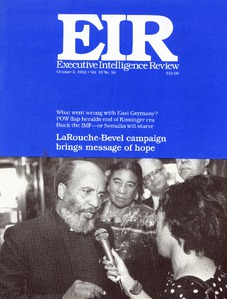Interviews
Sir Teddy Taylor
A Conservative Member of Parliament takes the John Major government to task for seeking scapegoats abroad for the humiliation of the pound sterling.
Rev. James Bevel
by Mel Klenetsky
A leader of the civil rights movement, Reverend Bevel is now the vice presidential running-mate of independent presidential candidate Lyndon LaRouche.
Departments
Report from Bonn
by Rainer Apel
A Change in Monetary Policies?
Andean Report
by Carlos Méndez
Clamor Grows for CAP’s Resignation.
From New Delhi
by Susan Maitra
Asia Watch in Bed with Naxalites.
Editorial
Soviet Justice from American Courts.
Political Economy
What Went Wrong with East Germany’s Economy?
by William Engdahl
The assassination of two of the Bonn government’s most competent economic policy strategists, Alfred Herrhausen and Detlev Rohwedder, had a disastrous effect, as the Anglophile free-traders moved in. Will the lessons be learned before it is too late?
Economics
On IMF ‘Titanic,’ a Scramble for the Best Deck Chairs
by William Jones
The International Monetary Fund’s director says the chaos on the world financial markets is a sign of the “remarkable resilience” of the monetary system. Meanwhile, the bankers and heads of state continue their suicidal replay of 1931.
Currency Chaos Reigns; Experts Talk Stability
by Marcia Merry
MP Says Britain Is ‘in a Terrible Mess’
by Mark Burdman
Russians Lose Patience with IMF’s Boy Gaidar
by Konstantin George
In Hungary, Opposition Targets the International Monetary Fund
by Birgitt Vitt
Currency Rates
‘Global 2000’ Gang Calls for Genocide against China and India
by Kathy Wolfe and L. Wolfe
Gear Up Construction Equipment Industry with LaRouche Program
by Anthony K. Wikrent
Farm Groups Flub Chance To Nix NAFTA
by Suzanne Rose
Documentation: Testimony before the House Agriculture Committee by Sue Atkinson, candidate for Senate in Iowa and a Food for Peace activist.
Agriculture
by Rosa Tennenbaum
Farmers Rally on German-Polish Border.
Business Briefs
Feature
LaRouche-Bevel Campaign Brings a Message of Hope
by Mel Klenetsky
Rev. James Bevel, who was one of the top lieutenants of Dr. Martin Luther King, explains why he is campaigning as the vice presidential running-mate of independent presidential candidate Lyndon LaRouche. “Any American,” he says, “black or white or indigenous, who does not join this revolution, will stand on the side five years up the road being ashamed of themselves for allowing the greatest revolution to take place right in their midst, and themselves too cowardly to join in it.”
A Christian Soldier Who Fights Without Violence
A profile of Rev. James Bevel.
International
Non-Victory in France’s Maastricht Referendum
by Christine Bierre and Volcker Hassmann
The slim victory for the partisans of the treaty creates a situation of maximum instability. The treaty itself is kaput, but the monetarist arguments that define Maastricht’s outlook define economic thinking at the top of nearly every government.
Capture of Guzmán Could End Shining Path, Despite Bush’s Support
by Luis Vásquez Medina
Shining Path’s Operatives Abroad
Envoy Warns of Genocide in Bosnia
Jordan’s Laith Shubeilat Framed Up as Anglo-Americans Drive for War
by Muriel Mirak-Weissbach
Demand Freedom for Laith Shubeilat
An international appeal by the Schiller Institute.
U.N. Wants To Help Trees, Not Refugees
by Joyce Fredman
Western Governments Offer Somalia U.N. Trusteeship, But Not Food
by Uwe Friesecke and Linda de Hoyos
Philip Morris, Drugs and Organized Crime
by Roger Moore
International Intelligence
National
Kissinger Under Fire on POW Scandal; the End of an Era?
by Edward Spannaus
Kissinger railed against “talk of conspiracy extending through five administrations,” concerning U.S. jettisoning of prisoners of war in Vietnam and Laos. Exactly, Henry.
A ‘Post-Industrial’ Descent into Hell
by H. Graham Lowry
The Lessons of Abraham Lincoln: ‘We Cannot Escape History’
by Rochelle Ascher
Ascher documents the sweeping reorganization of the U.S. economy along American System principles that was carried out by President Lincoln and his associates.
Elephants & Donkeys
by Katherine Notley
Clinton-Gore Currying Green, White Votes.
Eye on Washington
Howard Forum Targets ADL.
Congressional Closeup
by William Jones
National News



